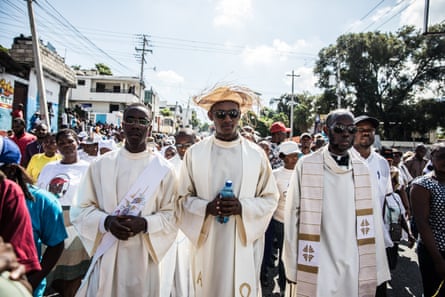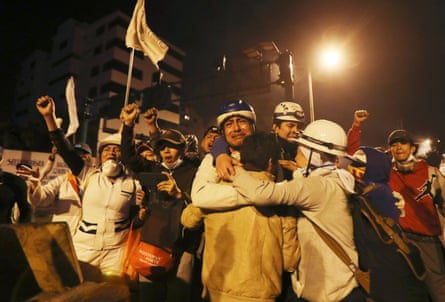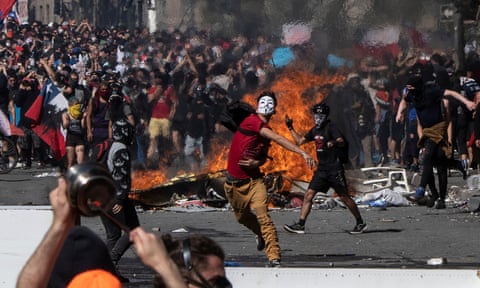Tanks on the streets in Chile. Barricades and bloodshed in Bolivia. Weeks of unrest that have pushed Haiti to the brink and forced Ecuador’s president to relocate his government.
“This is a social revolution,” said Andrea Lyn, a 61-year-old actor who took to the streets of Santiago this week. “It is us saying: no more.”
Latin America has been called “the forgotten continent” – but in recent weeks it has hardly been out of the news.
A succession of dramatic – and in several cases unforeseen – social explosions have catapulted the region into the global consciousness and left some asking if a Latin American spring has arrived. A headline in Mexico’s El Universal newspaper this week declared Latin America and the Caribbean “red hot”.
In an enormous and disparate region of 33 countries, more than 630 million people and governments from authoritarian left to far right, there is no single explanation for the political and social tremors currently rattling the region, from Quito to Caracas.
But longtime observers do see some common threads linking many of the convulsions.

Michael Reid, the author of Forgotten Continent: The Battle for Latin America’s Soul, saw three key catalysts: the economic discontent of an emerging middle class, fury over political roguery, and the influence of other global protest movements shaking cities from Paris and Barcelona to Hong Kong.
Six years of economic stagnation had brought an abrupt end to a commodity-fuelled 12-year period of growth and optimism during which poverty and inequality were reduced across Latin America.
Reid said: “Inequalities that were tolerable when there was a sense of opportunity and that the future was going to be better become less tolerable now – and you are seeing outbreaks of frustration when people feel that their wages are not going to go up or their children are not going to be better off than they are.”
A second stimulus was public rage against Latin America’s political machine after a wave of corruption scandals that have discredited traditional political elites, sparked furious protests in countries including Peru and Haiti, and propelled a new generation of populists to power in Brazil and Mexico.

Finally, Reid believed there was a “copycat element” at play as radical protesters in Ecuador and Chile were inspired by social media images of France’s gilets jaunes and Hong Kong’s “frontliners”.
Alma Guillermoprieto, a Mexican journalist and veteran chronicler of Latin America, said she saw the unrest as a mutiny of overworked and underpaid citizens pushed over the edge by what – from a middle-class perspective – might seem relatively trivial increases in transport costs.
“Life is tough, and you put up with it, you put up with it, you put up with it, you put up with it – and all of a sudden this one small thing comes and you say: ‘Fuck this!’” she said.
That seems to have been the case in Ecuador, where demonstrators flooded the streets this month after President Lenín Moreno scrapped longstanding fuel subsidies as part of a deal with the IMF.
“We can’t make ends meet,” complained Carmen Jaque, 50, a street vendor who was among thousands who marched on the capital.
In Chile, it was a 3% hike in metro fares that sparked what has become a far broader rebellion against inequality. “This is a country that is made for the rich,” said Lyn, the protesting actor. “The people couldn’t take it any more and exploded.”

Such sentiments are echoed in Haiti, where months of protests have left more than 20 dead and paralysed much of the country. “The government doesn’t do anything for us,” fumed Jerome, a resident of the ramshackle Cité Soleil shanty in the capital Port-au-Prince. “We are left to literally live in shit.”
Reid said he remembered only two other moments in his four decades covering Latin America when the region was in such a state of upheaval: during a period of “savage austerity” in the 1980s and then in the years leading up to Argentina’s devastating economic crash in 2001. “I think Latin America is up against it,” he said.
But Reid was not completely pessimistic about the region’s latest moment of ferment. “I think this is a catharsis – and we will see what happens on the other side.”
Guillermoprieto said she felt trepidation as she watched the surge of protests sweep a region she has chronicled since the 1970s.
“I don’t see any kind of forward movement as a result of these protests. [I feel] extreme worry and grimness,” she said.
“People have been talking about whether this is the Latin American spring. And I really don’t think it is because – just like in the US – there is absolutely no one waiting in the wings.
“So I think it is bound to mostly end in tears,” Guillermoprieto added. “There is a lot of frustration – but I don’t see how it can lead anywhere.”
Additional reporting by Charis McGowan in Santiago, Dan Collyns in Quito and Joe Parkin Daniels in Port-au-Prince
